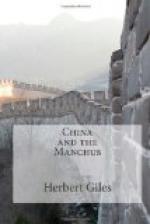By August, 1860, thirteen thousand British troops, seven thousand French, and two thousand five hundred Cantonese coolies, were ready to make another attempt. This time there were no frontal attacks on the forts from the seaward; capture was effected, after a severe struggle, by land from the rear, a feat which was generally regarded by the Tartar soldiery as most unsportsmanlike. High Manchu officials were now hurriedly dispatched from Peking to Tientsin to stop by fair promises the further advance of the allies; but the British and French plenipotentiaries decided to move up to T`ung-chow, a dozen miles or so from the capital. It was on this march that Parkes, Loch, and others, while carrying out orders under a flag of truce, were treacherously seized by the soldiers of Seng-ko-lin-sin, the Manchu prince and general (familiar to the British troops as “Sam Collinson"), who had just experienced a severe defeat at the taking of the Taku forts. After being treated with every indignity, the prisoners, French and English, numbering over thirty in all, were forwarded to Peking. There they were miserably tortured, and many of them succumbed; but events were moving quickly now, and relief was at hand for those for whom it was not already too late. Seng-ko-lin-sin and his vaunted Tartar cavalry were completely routed in several encounters, and Peking lay at the mercy of the foreigner, the Emperor having fled to Jehol, where he died in less than a year. Only then did Prince Kung, a younger brother of Hsien Feng, who had been left to bear the brunt of foreign resentment, send back, in a state too terrible for words, fourteen prisoners, less than half the original number of those so recently captured. Something in the form of a punitive act now became necessary, to mark the horror with which this atrocious treatment of prisoners by the Manchu court was regarded among the countrymen of the victims. Accordingly, orders were given to burn down the Summer Palace, appropriately condemned as being the favourite residence of the Emperor, and also the scene of the unspeakable tortures inflicted. This palace was surrounded by a beautiful pleasance lying on the slope of the western hills, about nine miles to the north-west of Peking. Yuean-ming Yuean, or the “Bright Round Garden,” to give it its proper name, had been laid out by the Jesuit fathers on the plan of the Trianon at Versailles, and was packed with valuable porcelain, old bronzes, and every conceivable kind of curio, most of which were looted or destroyed by the infuriated soldiery.
The ratification of the Treaty of Tientsin (1858) was now completed, and before the end of the year the allied forces were gone, save and except garrisons at Tientsin and Taku, which were to remain until the indemnity was paid.




